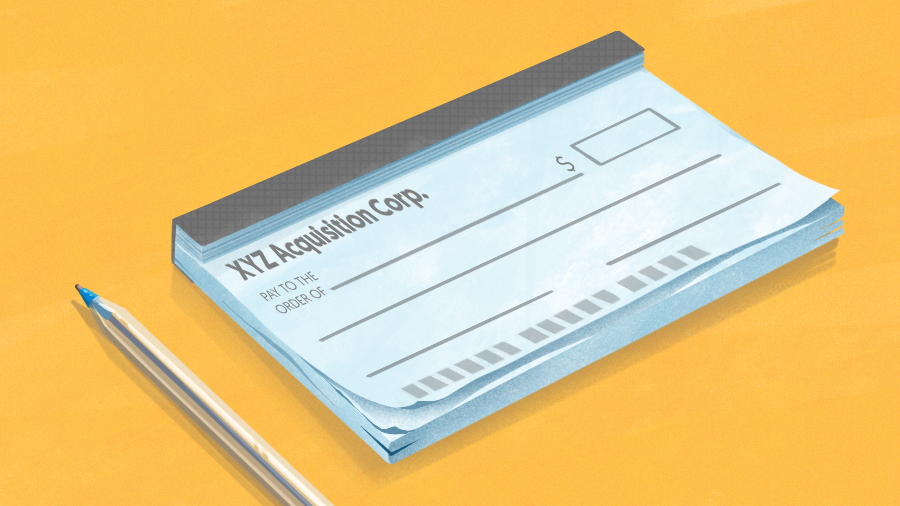If you look at the initial public offering and direct listing market today, getting in on a hot new stock has gotten rather expensive.
The year’s biggest tech offering, Snowflake, was valued around $60 billion post IPO. Several others debuted with market caps well over $10 billion.
Subscribe to the Crunchbase Daily
Tech companies that launched larger offerings tended to be on the older side, too. Two of the biggest, Palantir and Unity, are over 15 years old, while another soon-to-be public unicorn, Airbnb, launched in 2008 and has billions in revenue.
In short, the pipeline of public offerings looks good for those seeking a reasonably mature, pricey growth tech company for their stock portfolios. But for those with a higher appetite for risk and a desire to invest at an earlier stage, it’s a bit thin.
Enter the SPAC, or special purpose acquisition company. These publicly traded blank-check acquisition companies have been launching in droves in recent months, backed by billionaires, celebrities and even ex-politicians. As they multiply, the SPAC phenomenon is set to reshape the role of high-growth, venture-backed companies in public markets in profound ways.
In particular, it’s opening the door to the kinds of companies that in recent years have not been tapping public markets. That includes pre-revenue companies with moonshot goals (rather literally in the case of Virgin Galactic), automakers with no cars available yet (Fisker), and startups in sectors like autonomous driving that have attracted enormous VC and corporate investment but have few pure-play offerings for public investors.
“One thing we’re seeing (in public markets) is there’s so much money looking for yield,” said Don Butler, managing director of fintech- and software-focused VC firm Thomvest Ventures. “What we’re finding is a lot of them look at venture-backed companies and bet on long-term trends to disrupt an industry.”
SPAC targets
Generally, the VC-funded companies chosen as SPAC acquisition targets have lower revenues and less established business models than those opting for IPOs or direct listings, Butler said. Some are companies his firm passed on after vetting as potential late-stage investments.
The notion that startups in the SPAC pipeline tend to have weaker financials than IPO candidates appears born out by the available data. That’s based on a look at the financial statements available from a small portion of companies having chosen the SPAC route to public markets. Among those companies are:
- Desktop Metal, a heavily funded maker of metal and carbon fiber 3D printing systems, posted just $5.7 million in revenue in the first half of the year, well below year-ago levels, paired with a net loss of $45.6 million.
- Opendoor, the home buying and selling unicorn, posted a net loss of $118 million on $2 billion in revenue for the first half of 2020, with revenues down year over year amid the COVID-19 pandemic.
- Virgin Galactic, the commercial spaceflight pioneer, had just $238,000 in revenue in the first half of 2020, paired with a net loss of $122.4 million. The company went public in October 2019, after merging with a SPAC.
- Velodyne LiDAR, a developer of sensor technology used for autonomous driving, navigation and vehicle safety systems, had revenue of $45 million in the first half of 2020, down from year-ago levels, paired with a wider loss of $33 million. It went public via SPAC in late September.
Like most venture-backed tech IPOs, the companies going public via SPAC are far from profitable. For tech IPO candidates with major underwriters, however, it’s common to show revenue above or approaching $100 million, double-digit sales growth, and diminishing losses as a percent of revenues. Those “spacquisition” candidates appear to have a lower bar to public market admission.
That doesn’t mean their shares will be cheap. SPAC mergers announced in the past few weeks commonly come with expected public valuations in the billions. Opendoor is looking to go public at an initial valuation of $4.8 billion, while Desktop Metal is eyeing $2.5 billion. Virgin Galactic and Velodyne LiDAR meanwhile, were recently valued at $4.5 billion and $2.8 billion, respectively.
The future of SPACs
We’re still awaiting financials for many of the spacquisition candidates that have announced upcoming public listings. The list includes a number of venture-backed transportation-focused companies (electric carmaker Fisker, vehicle charging station-maker ChargePoint, and electric powertrain developer XL Fleet, among others) as well as fintech, agtech and gaming startups. (See the full list here).
The rate at which new blank-check companies are being formed indicates there will be a lot more acquisition targets announced in coming weeks. (SPACs have up to two years to identify a purchase target, but tend to announce one much more quickly.) Crunchbase News has been keeping tabs on weekly filings, and just last week 13 new ones popped up, with well-known sponsors including basketball legend Shaquille O’Neal and billionaire Alec Gores.
In a way, the trend of well-known investors and public figures launching SPACs has parallels to the venture industry, Butler observed. Because companies going public by this route commonly have unproven business models and steep losses, investors can take some solace in the fact that a prominent name is backing the deal.
“From the company perspective, it’s the difference between getting money from a no-name VC vs Sequoia,” he said. In the case of Opendoor and Virgin Galactic, for instance, it helps that the companies chose to merge with a SPAC launched by well-known startup investor and Golden State Warriors co-owner Chamath Palihapitiya.
No guarantees
Of course, a prominent backer is no guarantee of an ever-rising valuation. Take Nikola Motor, a developer of zero-emission trucks and electric powertrains that merged with a SPAC run by former General Motors Vice Chairman Steve Girsky. After going public in June, shares soared, with the company hitting a peak valuation of $35 billion in September.
Just weeks later, Nikola’s founder and Chairman Trevor Milton resigned amid allegations he had deceived investors about the company’s technology. The company is reportedly now under investigation by the Securities and Exchange Commission and the U.S. Justice Department. Shares are down more than 80 percent from their peak.
It sounds like a cautionary tale for over-ambitious startups eyeing the SPAC route, except for one thing: Even after all that, Nikola is still valued at over $7.5 billion, at least double its prior valuation as a private company a year ago.
Seems public investors are willing to overlook a lot of shortcomings in pursuit of potential disruptive, high-growth companies. For startups eyeing public offerings via SPAC that means it’s likely the current brisk pace of dealmaking and market debuts will continue.
Illustration: Dom Guzman

Stay up to date with recent funding rounds, acquisitions, and more with the Crunchbase Daily.



![Illustration of a guy watering plants with a blocked hose - Global [Dom Guzman]](https://news.crunchbase.com/wp-content/uploads/quarterly-global-3-300x168.jpg)
67.1K Followers